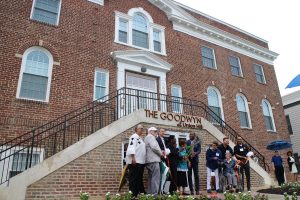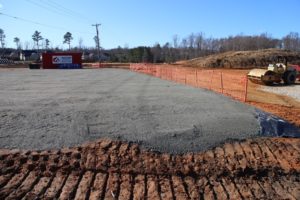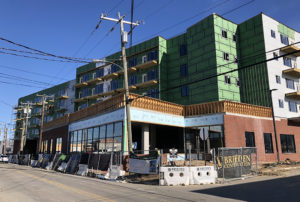
This week’s Assembly focused on how landlords in the Richmond area are weathering the pandemic. (BizSense graphic and screenshots)
Impacts of the coronavirus crisis on countless numbers of renters in the region are in turn trickling down to apartment managers and developers, a sampling of whom discussed challenges they are facing in the third installment of BizSense Assembly.
The online panel discussion series this week focused on issues faced by Richmond’s multifamily market amid the pandemic that has put thousands of people out of work, including apartment dwellers and others who may no longer be able to cover their monthly rents.
While apartment operators grapple with that, they’re also faced with an uncertain future in terms of whether to go forward with new development projects, and what those developments should look like in terms of amenities in a time of social distancing and public health concerns.
Those challenges and others were discussed at length by Wednesday’s panel, which consisted of David Hanchrow of Bristol Development Group, Greta Harris of Better Housing Coalition, Louis Salomonsky of Historic Housing, and Taylor Williams of Spy Rock Real Estate Group.
Salomonsky and Williams, whose firms both have multiple properties in Scott’s Addition, said rents in that neighborhood have largely held steady, while Salomonsky said his firm’s Main Street Realty arm has had to meet and work with about 3 percent of its tenants in other neighborhoods across the city, where Historic Housing has developed upwards of 2,000 units over decades.
Harris, the CEO of Better Housing, said it had a 6 percent reduction in rent collections in April, describing that as better than expected for the roughly 1,600 income-based rental units that the Richmond-based nonprofit manages locally.
“We have a lot of lower-wage, hourly workers that have been impacted by the pandemic. We have folks that were working in the hospitality industry, restaurant industry, and so far we have about 50 folks who have let us know that they’ve lost their jobs,” Harris said.
“We’re just working with individual families to be able to help put them on a path to economic mobility and to meet their basic needs, and help them not end up at the end of the summer with an insurmountable amount of deferred rent, which could be in the thousands of dollars.”

Better Housing Coalition cut the ribbon last year on its Goodwyn at Union Hill apartments. (BizSense file photo)
While panelists said the bulk of their tenants were able to pay their rent by April 1, they all said they’re preparing for harder months to come in May, June and potentially July.
“We’re really bracing for May,” said Hanchrow, chief investment officer at Tennessee-based Bristol Development, which has ramped up its local activity of late with projects such as its Canopy at Ginter Park apartments in Northside, Artistry at Winterfield on the Chesterfield-Powhatan line, and its planned Tapestry West apartments in Henrico’s Westwood area
“Even though our resident profile consists mainly of professionals and entrepreneurs, people who are self-employed, you just look at the statistics the last couple weeks and you’ve got to believe that there’s going to be some more hardship that sets in May 1,” Hanchrow said.
“Everybody has a fairly legitimate story, and we’re able to manage working with them well,” Salomonsky said of the tenants his firm has worked with. “We’re all holding our breath for what’s going to happen in May, June and July, and we’ll just take each case. All the banks and lenders are standing ready to fully cooperate. It’s amazing that amount of good cooperation all around that’s taking place.”
Lending support

A view of the site work from along Huguenot Trail for the Artistry at Winterfield development. (BizSense file photo)
Hanchrow and Williams likewise cited support from lenders, despite the financial crisis and economic downturn that the pandemic has brought.
“For our stabilized properties, the impact so far has been manageable, and we hope that it will continue to be manageable,” said Williams, who with fellow Spy Rock principal Andrew Basham has developed 2,700 apartments, primarily in the Scott’s Addition area. The 10-year-old firm has two mixed-use projects underway, along Myers Street and in front of the UMFS campus, and it’s planning another project along Ownby Lane at Hardywood.
“We don’t want to ask our lenders for help unless we truly need it, and if our tenants are paying rent like they did in April or close to it, we won’t need to ask for help,” Williams said. “We’ll let the banks help other sectors like restaurants and hotels that truly need it.
“In terms of projects we have on the drawing board, lenders are pausing right now,” he said. “It’s been 30 to 45 days since we’ve been into this, so that’s absolutely understandable and natural and the smart thing to do. As everyone on this panel can attest to, it’s a three- to five-year project from idea to stabilization, and we’re still in the planning phase and we’re moving along as fast as we can.”

Spy Rock’s new development along Myers Street will house 218 apartments and around 13,000 square feet of commercial space. (BizSense file photo)
Panelists said such plans likely will be adjusted in terms of amenity packages that traditionally have included spaces for large gatherings, such as pools, clubhouses and fitness centers that now are perceived differently in a time of social distancing.
“When we have resident events, there could be 100 people that show up in our clubrooms. We’ll probably transition those to outside or have fewer, more-focused events to keep people from being so tightly packed,” Williams said. “This is certainly causing us to rethink a number of things.”
‘Resilient during downturns’
While they ponder such adjustments, panelists said the times largely haven’t changed their plans for future apartment projects, or their optimism for the industry in Richmond in the years ahead.
“I think now is the time to be planning projects,” Williams said. “I think we’ll recover from this in the long term, and the projects we’re planning now, we deliver two years from now and we’ve stabilized three years from now – we’re going to be in a recovered market at that point, so we’re optimistic on that side.
“We like apartments right now for the same reason that we liked them before the crisis. They’re steadier than a lot of other asset classes, they’re resilient during downturns. I think that’s proving true relative to retail, hotels, certainly in this downturn,” he said.
Added Salomonsky, whose firm with business partner David White recently built the Scott’s View towers and is starting work on another apartment project in Scott’s Addition: “I think there’s going to be quite an interesting boom starting in about 16 to 18 months, and we’ll look back on this as being a good time to reorganize and restructure and be more efficient with the hectic growth that we’ve enjoyed over the past 10 years.”
Acknowledging the pandemic’s graver challenges worldwide, Williams said, “I don’t want to seem unsympathetic about what a lot of people are going through right now. For every one person that’s a confirmed case of COVID and they’re suffering, there’s 28 people that have lost their jobs, and that’s a big deal, so we’re going to be very flexible and sympathetic with our residents to get through this.
“We’re going to try to do our part and pay our mortgages and not get help unless we need it from lenders. But the long-term prospects for multifamily and for Richmond, we’re very bullish on,” he said.
BizSense Assembly is held every Wednesday at 11 a.m., each week with a focus on a different industry and with a new slate of panelists. Stay tuned for details on the next episode. Half of proceeds from ticket sales go to Feed More.

This week’s Assembly focused on how landlords in the Richmond area are weathering the pandemic. (BizSense graphic and screenshots)
Impacts of the coronavirus crisis on countless numbers of renters in the region are in turn trickling down to apartment managers and developers, a sampling of whom discussed challenges they are facing in the third installment of BizSense Assembly.
The online panel discussion series this week focused on issues faced by Richmond’s multifamily market amid the pandemic that has put thousands of people out of work, including apartment dwellers and others who may no longer be able to cover their monthly rents.
While apartment operators grapple with that, they’re also faced with an uncertain future in terms of whether to go forward with new development projects, and what those developments should look like in terms of amenities in a time of social distancing and public health concerns.
Those challenges and others were discussed at length by Wednesday’s panel, which consisted of David Hanchrow of Bristol Development Group, Greta Harris of Better Housing Coalition, Louis Salomonsky of Historic Housing, and Taylor Williams of Spy Rock Real Estate Group.
Salomonsky and Williams, whose firms both have multiple properties in Scott’s Addition, said rents in that neighborhood have largely held steady, while Salomonsky said his firm’s Main Street Realty arm has had to meet and work with about 3 percent of its tenants in other neighborhoods across the city, where Historic Housing has developed upwards of 2,000 units over decades.
Harris, the CEO of Better Housing, said it had a 6 percent reduction in rent collections in April, describing that as better than expected for the roughly 1,600 income-based rental units that the Richmond-based nonprofit manages locally.
“We have a lot of lower-wage, hourly workers that have been impacted by the pandemic. We have folks that were working in the hospitality industry, restaurant industry, and so far we have about 50 folks who have let us know that they’ve lost their jobs,” Harris said.
“We’re just working with individual families to be able to help put them on a path to economic mobility and to meet their basic needs, and help them not end up at the end of the summer with an insurmountable amount of deferred rent, which could be in the thousands of dollars.”

Better Housing Coalition cut the ribbon last year on its Goodwyn at Union Hill apartments. (BizSense file photo)
While panelists said the bulk of their tenants were able to pay their rent by April 1, they all said they’re preparing for harder months to come in May, June and potentially July.
“We’re really bracing for May,” said Hanchrow, chief investment officer at Tennessee-based Bristol Development, which has ramped up its local activity of late with projects such as its Canopy at Ginter Park apartments in Northside, Artistry at Winterfield on the Chesterfield-Powhatan line, and its planned Tapestry West apartments in Henrico’s Westwood area
“Even though our resident profile consists mainly of professionals and entrepreneurs, people who are self-employed, you just look at the statistics the last couple weeks and you’ve got to believe that there’s going to be some more hardship that sets in May 1,” Hanchrow said.
“Everybody has a fairly legitimate story, and we’re able to manage working with them well,” Salomonsky said of the tenants his firm has worked with. “We’re all holding our breath for what’s going to happen in May, June and July, and we’ll just take each case. All the banks and lenders are standing ready to fully cooperate. It’s amazing that amount of good cooperation all around that’s taking place.”
Lending support

A view of the site work from along Huguenot Trail for the Artistry at Winterfield development. (BizSense file photo)
Hanchrow and Williams likewise cited support from lenders, despite the financial crisis and economic downturn that the pandemic has brought.
“For our stabilized properties, the impact so far has been manageable, and we hope that it will continue to be manageable,” said Williams, who with fellow Spy Rock principal Andrew Basham has developed 2,700 apartments, primarily in the Scott’s Addition area. The 10-year-old firm has two mixed-use projects underway, along Myers Street and in front of the UMFS campus, and it’s planning another project along Ownby Lane at Hardywood.
“We don’t want to ask our lenders for help unless we truly need it, and if our tenants are paying rent like they did in April or close to it, we won’t need to ask for help,” Williams said. “We’ll let the banks help other sectors like restaurants and hotels that truly need it.
“In terms of projects we have on the drawing board, lenders are pausing right now,” he said. “It’s been 30 to 45 days since we’ve been into this, so that’s absolutely understandable and natural and the smart thing to do. As everyone on this panel can attest to, it’s a three- to five-year project from idea to stabilization, and we’re still in the planning phase and we’re moving along as fast as we can.”

Spy Rock’s new development along Myers Street will house 218 apartments and around 13,000 square feet of commercial space. (BizSense file photo)
Panelists said such plans likely will be adjusted in terms of amenity packages that traditionally have included spaces for large gatherings, such as pools, clubhouses and fitness centers that now are perceived differently in a time of social distancing.
“When we have resident events, there could be 100 people that show up in our clubrooms. We’ll probably transition those to outside or have fewer, more-focused events to keep people from being so tightly packed,” Williams said. “This is certainly causing us to rethink a number of things.”
‘Resilient during downturns’
While they ponder such adjustments, panelists said the times largely haven’t changed their plans for future apartment projects, or their optimism for the industry in Richmond in the years ahead.
“I think now is the time to be planning projects,” Williams said. “I think we’ll recover from this in the long term, and the projects we’re planning now, we deliver two years from now and we’ve stabilized three years from now – we’re going to be in a recovered market at that point, so we’re optimistic on that side.
“We like apartments right now for the same reason that we liked them before the crisis. They’re steadier than a lot of other asset classes, they’re resilient during downturns. I think that’s proving true relative to retail, hotels, certainly in this downturn,” he said.
Added Salomonsky, whose firm with business partner David White recently built the Scott’s View towers and is starting work on another apartment project in Scott’s Addition: “I think there’s going to be quite an interesting boom starting in about 16 to 18 months, and we’ll look back on this as being a good time to reorganize and restructure and be more efficient with the hectic growth that we’ve enjoyed over the past 10 years.”
Acknowledging the pandemic’s graver challenges worldwide, Williams said, “I don’t want to seem unsympathetic about what a lot of people are going through right now. For every one person that’s a confirmed case of COVID and they’re suffering, there’s 28 people that have lost their jobs, and that’s a big deal, so we’re going to be very flexible and sympathetic with our residents to get through this.
“We’re going to try to do our part and pay our mortgages and not get help unless we need it from lenders. But the long-term prospects for multifamily and for Richmond, we’re very bullish on,” he said.
BizSense Assembly is held every Wednesday at 11 a.m., each week with a focus on a different industry and with a new slate of panelists. Stay tuned for details on the next episode. Half of proceeds from ticket sales go to Feed More.


